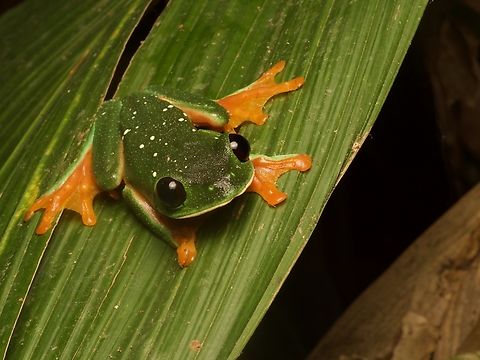
Appearance
Physically, Morelet's tree frog has a similar form to the related red-eyed tree frog, with which its range overlaps in areas, albeit slightly smaller, and with a more uniformly-green body, dark black eyes, and a red or pink underbelly.Distribution
Morelet's tree frog primarily inhabits moist, subtropical lowland forests, montane or cloud forests, or wetland habitats with sufficient tree cover. The species is found in the middle of Central America, from southern Mexico to NW Honduras, as well as Belize, El Salvador and Guatemala. In Mexico, they have been observed on both the Atlantic and Pacific slopes of Veracruz, particularly in the hills around Córdoba, even being found as far north as Cuetzalan, Puebla. On the Mexican Pacific coast, they have been found near Acapulco, Guerrero, and are also known from the states of Chiapas and Oaxaca. Elsewhere, the species has been observed in Celaque National Park, the Maya Mountains, most of the Pacific slopes of Guatemala's hills, and near the Santa Ana volcano and the Pacific slopes around San Salvador. They can live in untouched or disturbed habitats, and will breed in temporary or permanent bodies of water.Habitat
Its natural habitats are subtropical or tropical moist lowland forest, subtropical or tropical moist montane forest, freshwater marshes, and intermittent freshwater marshes.Reproduction
They have an extended breeding season during the summer months. When choosing a mate, the females tend to search for the males with the best sounding mating call. The males whose mating calls are the longest and have the most frequent pulses in pitch are the ones who get chosen by the females. They deposit clutches of 50 to 75 eggs on vegetation or rocks over water. The eggs of the Morelet's tree frog have a green pigment and when they hatch, the larvae fall into the water to complete their development into frogs.References:
Some text fragments are auto parsed from Wikipedia.